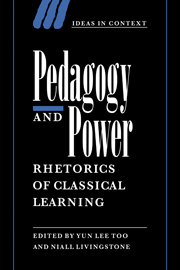Book contents
- Frontmatter
- Contents
- Notes on contributors
- Acknowledgements
- Introduction
- 1 Classics: from discipline in crisis to (multi-)cultural capital
- 2 Schoolboys and gentlemen: classical pedagogy and authority in the English public school
- 3 ‘Die Zung’ ist dieses Schwert': classical tongues and gendered curricula in German schooling to 1908
- 4 ‘What does that argue for us?’: the politics of teaching and political education in late eighteenth-century dialogues
- 5 Women and classical education in the early modern period
- 6 Pilgrimage to Parnassus: local intellectual traditions, humanist education and the cultural geography of sixteenth-century England
- 7 ‘Not so much praise as precept’: Erasmus, panegyric, and the Renaissance art of teaching princes
- 8 Teachers, pupils and imperial power in eleventh-century Byzantium
- 9 Reading power in Roman Greece: the paideia of Dio Chrysostom
- 10 Children, animals, slaves and grammar
- 11 A good man skilled in politics: Quintilian's political theory
- 12 The voice of Isocrates and the dissemination of cultural power
- 13 Xenophon's Cyropaedia: disfiguring the pedagogical state
- Select bibliography
- Index
- IDEAS IN CONTEXT
8 - Teachers, pupils and imperial power in eleventh-century Byzantium
Published online by Cambridge University Press: 30 September 2009
- Frontmatter
- Contents
- Notes on contributors
- Acknowledgements
- Introduction
- 1 Classics: from discipline in crisis to (multi-)cultural capital
- 2 Schoolboys and gentlemen: classical pedagogy and authority in the English public school
- 3 ‘Die Zung’ ist dieses Schwert': classical tongues and gendered curricula in German schooling to 1908
- 4 ‘What does that argue for us?’: the politics of teaching and political education in late eighteenth-century dialogues
- 5 Women and classical education in the early modern period
- 6 Pilgrimage to Parnassus: local intellectual traditions, humanist education and the cultural geography of sixteenth-century England
- 7 ‘Not so much praise as precept’: Erasmus, panegyric, and the Renaissance art of teaching princes
- 8 Teachers, pupils and imperial power in eleventh-century Byzantium
- 9 Reading power in Roman Greece: the paideia of Dio Chrysostom
- 10 Children, animals, slaves and grammar
- 11 A good man skilled in politics: Quintilian's political theory
- 12 The voice of Isocrates and the dissemination of cultural power
- 13 Xenophon's Cyropaedia: disfiguring the pedagogical state
- Select bibliography
- Index
- IDEAS IN CONTEXT
Summary
To Aris Spanos
χάρις χάριν γάρ ἐστιν ἡ τίκτουσ' ἀεί.
The negative image of Byzantium drawn by historians of the Enlightenment and Romanticism is well known. In an attempt to correct this image Byzantinists have repeatedly pointed to the continuous cultivation of ancient learning during the Christian Greek Middle Ages. Yet the Byzantines themselves were partly responsible for both negative and positive images, which are to a substantial degree misrepresentations, in that, within their highly conservative society, they very often presented their thoughts in a manner seemingly unaltered since Hellenistic antiquity. Pedagogy is just such a case: viewed superficially, nothing changed from late antique grammarians to the end of the Byzantine Empire in the mid-fifteenth century. However, during specific periods of Byzantine history a series of ideological clashes lead to important changes in education and in the perception of pedagogy. These clashes were primarily and most importantly conducted between philosophy and theology in order to define the meaning and function of ancient learning within a Christian society.
The present paper will focus on one period in Byzantium's millenium-long history, the eleventh century, when it appeared as if involvement with ancient learning would lead to a new approach to knowledge. The eleventh century was a period of change in Byzantium's history, and its peculiar mixture of politics, religion and pedagogy characterises a state which at that point obsessively promoted its claim to ecumenical power and culture.
- Type
- Chapter
- Information
- Pedagogy and PowerRhetorics of Classical Learning, pp. 170 - 191Publisher: Cambridge University PressPrint publication year: 1998
- 24
- Cited by

